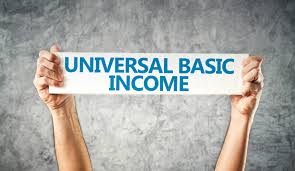Blockchain Based Universal Basic Income Is Our Gateway For True Government Transparency
What problems does UBI solve?
- Income for displaced workers from automation (i.e. transport, sales, factory, farming, etc.)
- Provides safety margin for these workers to make additional income from traditional soft trades such as arts, humanities, and social causes
- Provides workers more time to gain skills for new human labor markets such as in crowdsourcing many hard problems of today's data rich economy, such as prediction, content filtering, curation, investigative blogging, and government and industry oversight
- Model by which governments could scale to replace costly entitlement and social security programs
- Legacy programs such as social security and medical insurance is rife of fraud and corruption which an openly auditable UBI framework would completely resolve
- With less costs on social programs, comes less need for tax revenue, and to less taxes
How would it be sustainable?
There are no hard, fast rules for UBI. There has been no example of which I know. Even so, I bet at some point in history a government, city, or tribe has tried it, but certainly, without a blockchain. So, my UBI blockchain hard, fast rules would be:
Year zero, advocates for the UBI token work with a decentralized crytpoexchange to have it support at least a (BTC , UBI) market, enrolls nodes for producing blocks, assuming a DPOS consensus mechanism, and at genesis, uniformly distributes the initial issuance across all UBI wallets on a weekly basis, i.e. 100 wallets, 1,000,000 UBI tokens, 52 payments each year, means first week, each wallet gets 192.3 UBI tokens, but on the 2nd week, 200 wallets, 990,000 UBI tokens, 51 payments left in year, means second week, each wallet gets 97.1 UBI tokens, assuming the additional 100 wallets did not contribute any UBI.
New wallet creation, i.e. any wallets past the wallets at genesis block, requires a fee, say 100 UBI tokens. Users can buy UBI tokens from ( BTC, UBI ) market exchange from UBI token source to cover creation fees. Some of these available UBI tokens are recycled from buybacks and some are created from inflation. Price discovery will occur at market. These fees are added to the distribution pool for next year. At the start of the next year, UBI blockchain will match the total of fees over the course of the previous year, thereby creating inflation. For example, if in year zero, 100 new wallets were created, then 10,000 UBI tokens were collected as fees in year zero. Starting with year one, UBI blockchain creates 10,000 UBI tokens, thereby creating inflation, and adds that amount to the distribution pool, totaling now 20,000 UBI tokens.
Why would it make for true government transparency?
Assuming this UBI model would be a framework for governments to replace their entitlement and insurance programs, its benefits would naturally drive adoption over to the rest of government spending. Now, one of the major benefits of any blockchain, is its complete accountability and non-repudiable nature of transactions. This of course, makes for complete transparency, which removes inefficiencies from errors and fraud, but also removes current practices of secret dealings. These dealings would be available for the public to judge government officials in how they vote, create policies, and how they campaign.
This can't get here soon enough. I would rather have loss of privacy for government agencies and officials and the resulting effects of slow due process rather than greased government action that lines the palms of officials and companies.

compounding...
compounding...
compounding...
compounding...
compounding...
compounding...
compounding...
compounding...